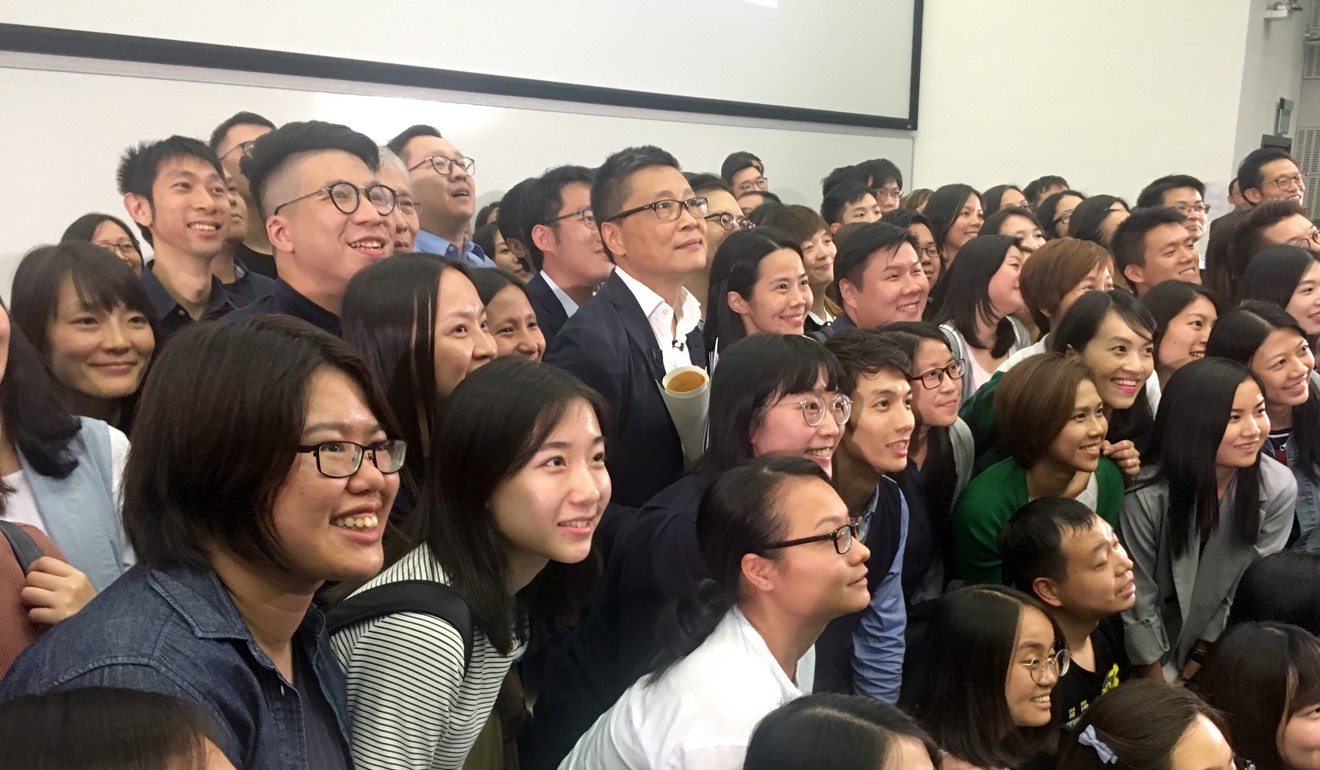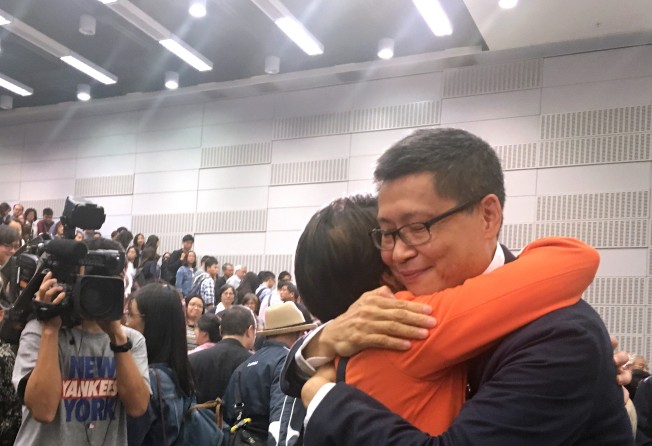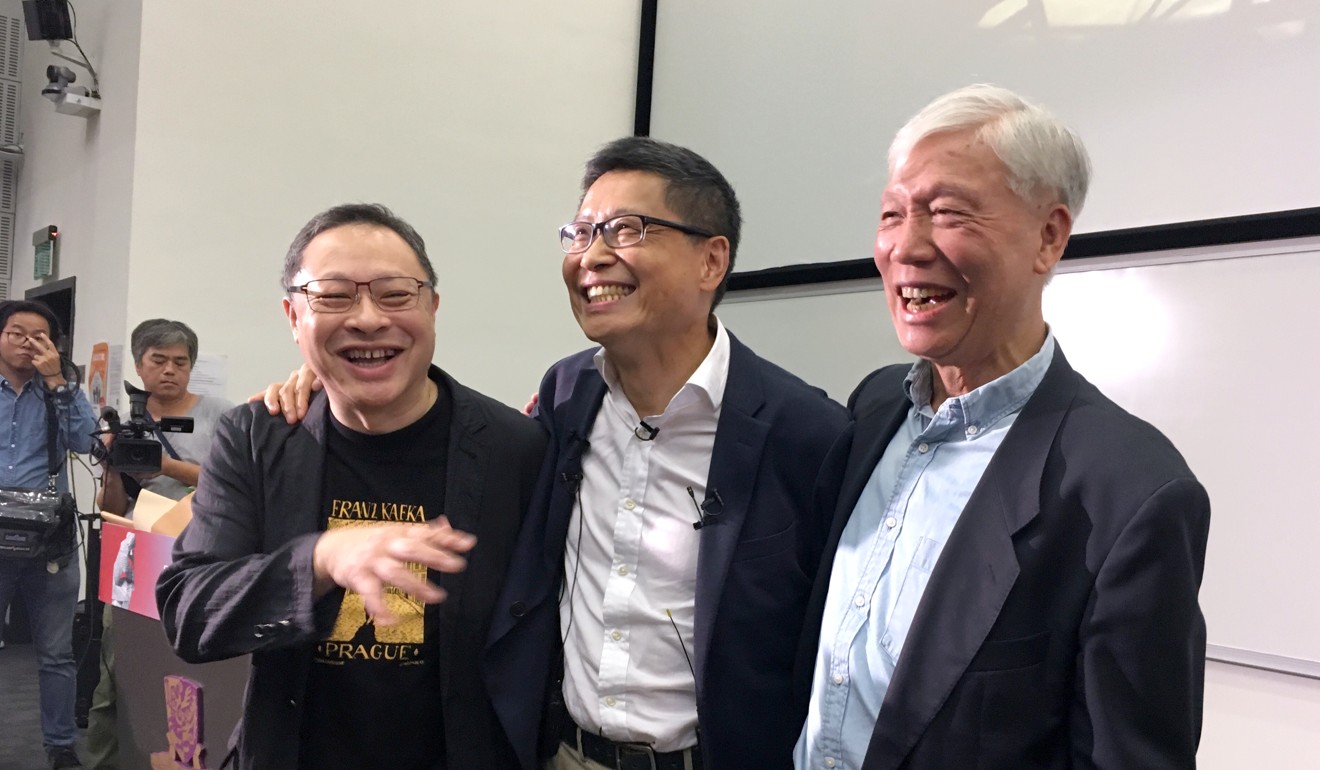
Occupy co-founder Chan Kin-man wonders whether Chinese people need to live in authoritarian society in farewell lecture days before he is due to stand trial
- Social scientist leaves Chinese University with three-hour talk, but vows to continue study into mainland social issues
- Scholar is facing years in jail over role in civil disobedience movement

Some 700 people crammed into a Chinese University hall designed for just 500 to listen to Chan Kin-man deliver his last lecture before he stands trial for his role in the Occupy movement.
Despite highlighting the uncertainty that lies ahead for his family, the social scientist said he would not back away from seeking to answer the question that has defined his academic career: why is mainland Chinese society still dominated by authoritarianism?
As local and overseas scholars, activists, students past and present watched on, the co-founder of the large-scale civil disobedience movement in 2014 covered a range of topics in his three-hour talk, ultimately leaving questions unanswered on the future of Hong Kong and the mainland.

Chan goes to court on Monday and faces the prospect of spending years in jail if found guilty, but has vowed to continue his study into the mainland, because China’s status “is indispensable to Hong Kong’s future”.
“I want to know why, after thousands of years, mainland China remains an authoritarian society,” Chan said. “And why we have failed to build a civil society on the mainland, and why intellectuals still see serving the ruler as their ideal, instead of being independent and critical voices.
“[I wonder] whether the Chinese people have a character that longs for authority.”
Wednesday night’s talk, organised by Chan's CUHK colleague and fellow political scientist Chow Po-chung, was the scholar’s swansong at the university after the 59-year-old, who has at least five more years remaining on his tenure, chose to retire before his trial began.
Chan and two of his Occupy co-leaders, Benny Tai Yiu-ting and Reverend Chu Yiu-ming, face three charges related to public nuisance. The movement, which saw protesters occupy parts of Hong Kong for 79 days, was sparked by complaints against the rigid electoral framework handed down by Beijing, and the determination to strive for universal suffrage.
The departing scholar began his three-hour long lecture by recalling the jailing of mainland Chinese students, and Taiwanese scholars, in the late 1970s and early 1980s, which inspired him as a young social science student to fight for justice and social change.
Intellectuals at the time were striving for democratic reform and freedom of speech on the mainland and in Taiwan, but faced year-long, or even life sentences, by the respective governments.
“While I was enjoying my college life in campus, they were being sent to jail,” Chan said. “When I came to read the students’ writing, it was impossible to feel numb.”

Chan could face a similar fate, but has shown little concern towards the lengthy jail sentences he could face, and during the lecture repeatedly encouraged the audience not to give up on striving for democracy in Hong Kong.
“Compared with the pre-reform status of the entities that have successfully transformed in history, Hong Kong is actually well prepared for democracy,” he said.
“We have a robust civil society, rule of law, opposite political forces and a civil service with integrity. Those who said Hong Kong is not ready are talking b******t.”
Chan's sister Kitty told the Post the family was not as tough as Chan himself.
“Kin-man's parents were rather unsupportive of his participation in the social movement,” she said.
“When he became the organiser of the Occupy movement I was already very worried about him being jailed.
“The concern gradually dropped, and now I have learned to stay calm and patient, as there’s not really much we could do.”
Support for Chan has poured in from overseas scholars. The International Society for the Third Sector Studies, an international association for scholars studying civil society and non-profit organisations, wrote to the city’s leader, Chief Executive Carrie Lam Cheng Yuet-ngor, on Monday to urge the local justice system to acknowledge Chan’s achievement in promoting peaceful action for universal suffrage, and to drop all charges against him.
Professor Hsu Shih-Jung, of Taiwan’s National Chengchi University, praised Chan for being instrumental in introducing the concept of civil society to mainland students and mainland Chinese scholars, and said his early retirement was a huge loss to Hong Kong academia.
“If Chan Kin-man is convicted in the end, it would send a hugely negative message that Hong Kong’s democracy, freedom and human rights have suffered a huge decline,” Hsu told the Post. “China will also be falling back from becoming a civilised nation.
Hsu said Chan’s work on civil society in China would one day be rightly recognised for its importance.
“Each and every year he was invited to key Chinese universities to give lectures, and he has friends in academia and universities all over the nation,” Hsu said. “It’s fair to say he sowed the seed of China’s civil society.
“Although China now bans public discussion of this concept, there is still a momentum that may materialise at some point. By then, Chan’s long-standing contribution will be remembered.”